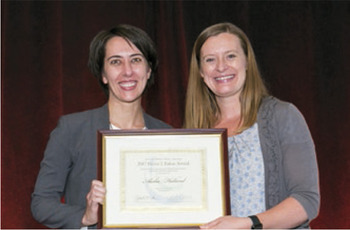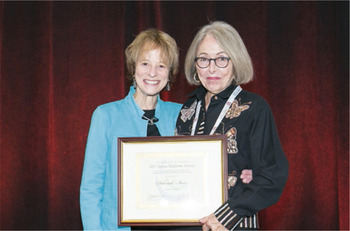At the 2017 APSA Awards Ceremony, the association recognized an exceptional group of diverse individuals for their contributions to political science. The ceremony was held on Wednesday, August 30, 2017 at the Westin St. Francis in San Francisco. This year APSA gave 26 awards recognizing outstanding achievement in the profession in the categories of dissertation awards, paper and article awards, book awards, and career awards. A complete list of the awards is included in the Gazette section of this issue, and a listing of the Organized Section awards is provided later in this section.

Outgoing APSA President, David Lake, University of California, San Diego, kicks off the awards ceremony.

2017 Annual Meeting Program Chairs Susan Hyde, University of California, Berkeley, and Amaney A. Jamal, Princeton University, recognize each of the recipients.

Jeremy Ferwerda, Massachusetts Institute of Technology, receives the Gabriel A. Almond Award from Kimuli Kasara, Columbia University. It is given annually for best dissertation in the field of comparative politics.

Bai Linh Hoang, University of Michigan, receives the William Anderson Award from Michael Hail, Morehead State University. It is given annually for best dissertation in the general field of federalism or intergovernmental relations, state, and local politics.

Alexander Hertel-Fernandez, Harvard University, receives the Harold D. Lasswell Award from Susan Hyde, University of California, Berkeley. It is given annually for best dissertation in the field of public policy and is supported by the Policy Studies Organization.

Rochelle Terman, University of California, Berkeley, receives the Merze Tate Award from Amaney A. Jamal, Princeton University. It is given annually for best dissertation in the field of international relations, law, and politics.

Mallory SoRelle, Cornell University, receives the E.E. Schattschneider Award from Susan Hyde, University of California, Berkeley. It is given annually for best dissertation in the field of American government.

Kevin Duong, Cornell University, receives the Leo Strauss Award from Deborah Baumgold, University of Oregon. It is given annually for best dissertation in the field of political philosophy.

Alan Zarychta, University of Colorado, Boulder, receives the Leonard D. White Award from Susan Hyde, University of California, Berkeley. It is given annually for the best dissertation in the field of public administration and is supported by the University of Chicago.

Kenneth Greene, University of Texas at Austin, receives the Franklin L. Burdette/Pi Sigma Alpha Award from Amaney A. Jamal, Princeton University. It is given annually for the best paper presented at the previous year’s annual meeting and is supported by Pi Sigma Alpha.

Alisha Holland, Harvard University, receives the Heinz Eulau Award from Susan Hyde, University of California, Berkeley. It is awarded annually to the best articles published in the American Political Science Review and Perspectives on Politics in the previous calendar year, is supported by Cambridge University Press, and was awarded for Holland’s APSR article “Forbearance.”

Vaughn Rasberry, Stanford University, receives the Ralph J. Bunche Award from Keith Banting, Queen’s University. It is given annually for the best scholarly work in political science that explores the phenomenon of ethnic and cultural pluralism and was awarded for his book Race and the Totalitarian Century: Geopolitics in the Black Literary Imagination.

Candelaria Garay, Harvard Kennedy School, receives the Robert A. Dahl Award from Claire Adida, University of California, San Diego. It is given annually to an untenured scholar who has produced scholarship of the highest quality on the subject of democracy and was awarded for her book Social Policy Expansion in Latin America.

Dara Kay Cohen, Harvard Kennedy School receives the Theodore J. Lowi Award from David Lake, University of California, San Diego, Ilter Turan, Bilgi University, and Guy Lachapelle, Concordia University. It is given annually for the best first book in any field of political science, showing promise of having substantive impact on the overall discipline and was awarded for her book Rape During Civil War.

Christina Wolbrecht, University of Notre Dame accepts the Victoria Schuck Award on behalf of herself and her co-author J. Kevin Corder, Western Michigan University, from Christina Ewig, University of Minnesota. It is given annually for the best book published on women and politics and was awarded for their book Counting Women’s Ballots: Female Voters from Suffrage through the New Deal.

Eric Schickler, University of California, Berkeley, receives the Woodrow Wilson Foundation Award from Susan Hyde, University of California, Berkeley. It is given annually for the best book on government, politics, or international relations and is awarded for his book Racial Realignment: The Transformation of American Liberalism, 1932-1965. The award, formerly supported by the Woodrow Wilson Foundation, is sponsored by Princeton University.

James L. Perry, Indiana University, receives the John Gaus Award from Amaney A. Jamal, Princeton University. The award and lectureship honors the recipient’s career of exemplary scholarship in the joint tradition of political science and public administration.

Michael Genovese, Loyola Marymount University, receives the Distinguished Teaching Award from Nancy Kassop, State University of New York, New Paltz. It honors an outstanding contribution to undergraduate and graduate teaching political science at two- or four-year institutions.

Lloyd Axworthy, University of Winnipeg, receives the Hubert H. Humphrey Award from Mary Fainsod Katzenstein, Cornell University. It is given annually in recognition of notable public service by a political scientist.

Bernard Boxill, University of North Carolina, Chapel Hill, receives the Benjamin E. Lippincott Award from Sarah Song, University of California, Berkeley. It is given biennially to recognize a work of exceptional quality by a living political theorist that is still considered significant after a time span of at least 15 years since the original date of publication and is awarded for his book Blacks and Social Justice.

Deborah Stone, Brandeis University, receives the James Madison Award from Helen Ingram, University of California, Irvine. It is given triennially to an American political scientist who has made a distinguished scholarly contribution to political science.

Michael Dawson, University of Chicago, receives the Hanes Walton, Jr. Award from Alvin Tillery, Northwestern University, and Jane Junn, University of Southern California. It is given biennially to a political scientist whose lifetime of distinguished scholarship has made significant contributions to our understanding of racial and ethnic politics and illuminates the conditions under which diversity and intergroup tolerance thrive in democratic societies.

Former editor of Perspectives on Politics, Jeffrey Isaac, Indiana University, receives the Frank J. Goodnow Award from Susan Hyde, University of California, Berkeley. It recognizes service to the community of political science by teachers, researchers, and public servants who work in the many fields of politics.
The following recipients could not be present to accept their awards:
Edward S. Corwin Award
The Edward S. Corwin Award is given annually for best dissertation in the field of public law.
Recipient: Allison Harris, University of Chicago
Title: “Who’s on the Bench?: Political Implications of Judicial Characteristics and Judicial Selection Methods in the US”
Heinz I. Eulau Award – Perspectives on Politics
The Heinz Eulau Award is awarded annually to the best article published in Perspectives on Politics in the previous calendar year. The award is supported by Cambridge University Press.
Recipients: Matthew Kocher and Nuno Monteiro, Yale University
Title: “Lines of Demarcation: Causation, Design-Based Inference, and Historical Research”
Gladys M. Kammerer Award
The Gladys M. Kammerer Award is given annually for the best book published during the previous calendar year in the field of US national policy.
Recipients: Gary J. Miller, Washington University in St. Louis, and Andrew B. Whitford, University of Georgia
Title: Above Politics: Bureaucratic Discretion and Credible Commitment
Charles E. Merriam Award
The Charles E. Merriam Award is given biennially to a person whose published work and career represent a significant contribution to the art of government through the application of social science research.
Recipient: Bernard Grofman, University of California, Irvine
Carey McWilliams Award
The Carey McWilliams Award is given annually for a major journalistic contribution to our understanding of politics.
Recipient: Jake Tapper, CNN


